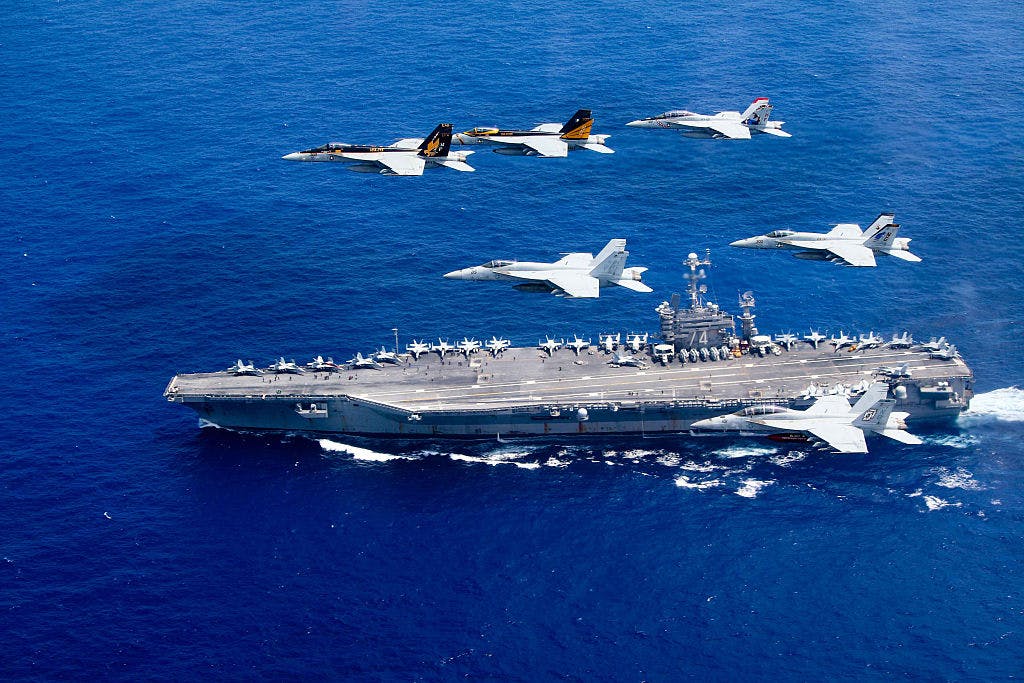Upcoming Summit With Japan, Korea Is Latest Signal of U.S. Scramble To Deter China, as New Analysis Warns America’s Military ‘Superiority Is Gone’
Historic sensitivities could prevent South Korea and Japan from cooperating on defense, as American and its allies grapple with the loss of their ‘virtual monopoly on the technologies and capabilities that made them so dominant,’ Rand says.

From Northeast Asia to Australia, the lines of confrontation are deepening in the Indo-Pacific as Communist China expands its power and Washington and its allies scramble to build up their defenses — a challenge underscored by a new Rand Corporation analysis that warns America’s military “superiority is gone.”
“It has become increasingly clear that the U.S. defense strategy and posture are insolvent,” the Rand report says. “The United States and its allies no longer have a virtual monopoly on the technologies and capabilities that made them so dominant against adversarial forces.”
America’s waning military strength looms over the summit President Biden is hosting at Camp David on August 18 with the leaders of South Korea and Japan.
Together, South Korea’s president, Yoon Suk-yeol, and Japan’s prime minister, Fumio Kishida, have reason to be alarmed by the specter of China and Russia, with a long history of interest in exercising control over the Korean peninsula, cooperating closely in their mutual bid for regional power.
Mr. Biden will doubtless play upon these fears at Camp David, even as the protection offered by America’s defense umbrella, the Rand report suggests, isn’t as potent as it was in earlier years.
Even so, the Rand report says, America and its allies “do not require superiority to defeat aggression by their most powerful foes,” provided Washington collaborates “with key allies and partners” to “restore credible postures of deterrence.”
These recommendations could serve as a kind of subtext for the upcoming summit, as the three leaders will “discuss expanding trilateral cooperation across the Indo-Pacific and beyond,” the White House said, including the threat posed by North Korea.
At Camp David, the White House said, “the leaders will celebrate a new chapter in their trilateral relationship” and “reaffirm their strong bonds of friendship,” including “ironclad alliances” between America and Japan, and “the United States and the Republic of Korea.”
The problem with any talk of a trilateral arrangement, though, is that the Koreans and Japanese are at bitter odds over familiar, critical issues.
These range from the wording of histories of Japanese colonialism over Korea to payment for millions of Koreans made to work as slave labor for Japanese factories in World War II to compensation for “comfort women,” or their heirs, who were forced to serve Japanese soldiers.
For those reasons it’s beyond imagination that Tokyo and Seoul will join in a trilateral alliance with Washington, but Mr. Biden sees the trilateral summit as drawing them together so tightly as to cooperate in a war with North Korea and possibly even China.
The Americans would love to see the two engaging routinely in trilateral military exercises. Japanese and Korean warships have already cooperated to a limited degree in joint naval exercises, but how about combining air and naval games with ground forces in an assault similar to the American Marines’ annual exercises on South Korea’s east coast?
Millions of Koreans with memories of Japan as a harsh colonial master might object, but the point is to see if the two can work closely together as de facto allies not bound by a formal alliance.
Equally important, South Korea and Japan are transfixed by the menace of China, whose president, Xi Jinping, sees Taiwan is just as important as North Korea while extending Chinese influence from the South Pacific to Southeast Asia to the Indian subcontinent, the Middle East, and even Europe and Africa.
Persuading South Korea and Japan to share common ground on Chinese expansionism, though, may not be easy considering their differing priorities and attitudes.
Mr. Yoon must always be mindful that China is by far the South’s biggest trading partner. If Mr. Xi were to finally try to make good on his vows eventually to recover the Republic of China on Taiwan as a lost Chinese province, Mr. Yoon would not want to be drawn into the conflict. Nor would he be happy about American forces using South Korea as a springboard for Taiwan’s defense.
Japan’s attitude toward the defense of Taiwan would likely be quite different. Japanese rule over Taiwan, between Japan’s victory over China in the Sino-Japanese in 1895 and Japan’s surrender in World War II 50 years later, may have been harsh, but the Taiwanese resented Qing dynasty rule and were not so deeply opposed to Japanese intervention.
Yet another factor may buttress the desire for Korean-Japanese cooperation: the revival of Russia as a regional power — and Chinese friend and possible ally.
Both the Russian defense minister, Sergei Shoigu, and a ranking member of the politburo of the Chinese Communist Party, Li Hongzhong, were guests last week at Pyongyang for the 70th anniversary of the armistice that ended the fighting in the Korean War.
Heightening concerns, China and Russia last month conducted joint air and naval exercises in the waters between the Korean peninsula and Japan.
The summit at Camp David, the White House said, “will advance a shared trilateral vision for addressing global and regional security challenges.”
That covers a wide range of interests — and a degree of cooperation that Mr. Biden hopes will persuade Messrs. Yoon and Kishida to forget the past in the interests of standing firm against their enemies.

